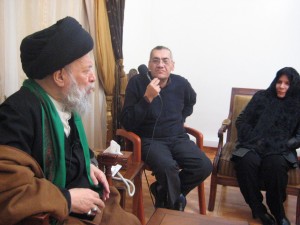Ayatollah Fadlallah’s Legacy
 Lebanon’s Grand Ayatollah Mohammed Hussein Fadlallah died on Sunday, snuffing out one of the most important voices for reform and restraint inside the milieu of Shia Islamism. As I wrote in Fadlallah’s obituary in The New York Times, the cleric had made his name as an advocate for the Shia awakening in the 1960s and 1970s, and then as a justifier of suicide bombings by Islamists.
Lebanon’s Grand Ayatollah Mohammed Hussein Fadlallah died on Sunday, snuffing out one of the most important voices for reform and restraint inside the milieu of Shia Islamism. As I wrote in Fadlallah’s obituary in The New York Times, the cleric had made his name as an advocate for the Shia awakening in the 1960s and 1970s, and then as a justifier of suicide bombings by Islamists.
But he also won droves of supporters all across the Islamic world, including the non-Arab nations, because of his work on family law. He found that women should have an easier time winning divorces under Islamic law, and that they have the right to defend themselves from domestic violence. He directed vast sums of money to hospitals and charity groups, even setting up for-profit businesses like hotels and gas stations in under-served Shia areas and then funneling the proceeds to his social services network. Most of the Shia women I know, even those who sympathize with Hezbollah, considered Fadlallah their religious reference.
In January 2009, I interviewed him at his official headquarters around the corner from the mosque where he preached. He railed against the infighting in the Islamic world between Shia and Sunni Muslims, and between Muslims and Christians. Eventually, he said, America and Iran would arrive at a rapprochement, and so too would Israel and its neighbors (this last statement surprised me the most).
To a Westerner, it might be hard to distinguish among the different marjas, or “sources of emulation,” that devout Shia Muslims follow. They all believe that religious jurists have the right to issue fatwas on everything from marital relations to geopolitics. Beyond this common point, however, leaders like Fadlallah – and to a lesser extent, Grand Ayatollah Ali Sistani in Najaf – have provided a very different model than some of their counterparts in Qom, who advocate the Iranian model of wilayat al faqih, or direct rule by the jurisprudent (that is, the ayatollahs govern directly.)
Fadlallah believed the authority of the clerics depended on their authority among the people (and not solely from their divine link to God). He also believed that Islamic resistance had to retain its “humanism,” and therefore he condemned acts and movements that considered terrorist – like the Sept. 11 attacks, and the ongoing efforts of Al Qaeda. “We are not at war with the American nation,” he told me.
There aren’t many religious leaders whose views carry such weight and yet are willing to criticize their own followers and the movements that they inspire. Now there’s one fewer.

